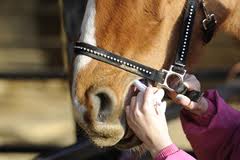|
Deworming Horses
The following procedure prevents horses from spitting out an oral dewormer

First Rinse out the horse’s mouth if possible. This loosens grain or hay to which dewormer could stick and prompts the horse to spit it out.
Second Place your left thumb in the back of the horse’s lips in the space between the incisors (front teeth) and the premolars (cheek teeth) where there are no teeth.
Third Insert the end of the tube alongside your thumb so the paste or gel will be placed on the horse’s tongue at the back of its mouth. Gently squirt the dewormer onto the horse’s tongue. Next, raise the horse’s head and/or massage its throat latch to encourage swallowing.
Frequency of use of any dewormer depends on how long it takes between treatment and the reappearance of large numbers of parasite eggs in the animal’s manure. This interval is known as the eggs’ re-appearance period. It is necessary to use a dewormer every 30 days if parasite eggs re-appear within this time period.
In the past, most dewormers were used every 30 days. That procedure changed with the discovery of ivermectin and moxidectin, which keep parasite numbers down longer than other dewormers currently on the market. Ivermectin consistently depresses parasite egg numbers for about 60 days, while moxidectin is effective for about 90 days. Deworming less frequently with ivermectin or moxidectin also helps prevent parasite resistance and puts less stress on horses.
Horses can also be dewormed daily. Daily feeding of pyrantel tartrate (Strongid-C or Strongid-C 2X) prevents infection with small and large strongyles, roundworms, and pinworms that the horse can pick up while grazing. Pyrantel tartrate is not effective against bots, however. Daily deworming prevents parasite infections, halts migration of some parasites, and reduces the tissue damage parasites cause. Manure from continually dewormed horses can be spread on horse pastures, because it contains no living stages of strongyles.
There are some disadvantages deworming Horses with such a program. Cost may be more than periodic purge doses, horses raised on continual dewormers may not develop natural resistance to parasites such as roundworms, and horses removed from continual deworming may exhibit severe clinical signs of parasite infection when finally exposed to internal parasites.
SOURCE - C. Wood, Deworming Horses
Return from Deworming horses to Horse Riding Connection
|
